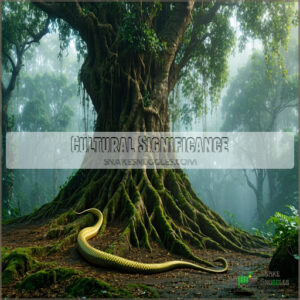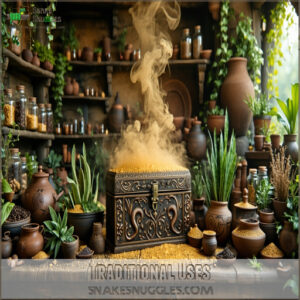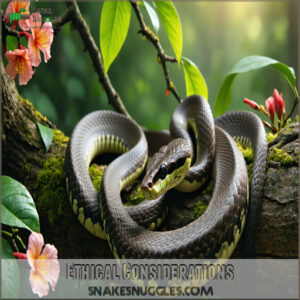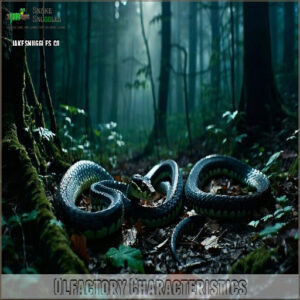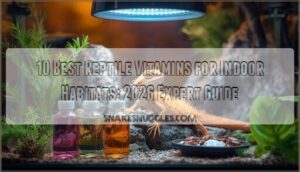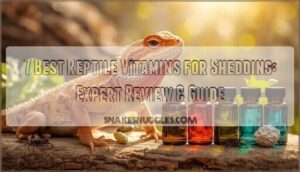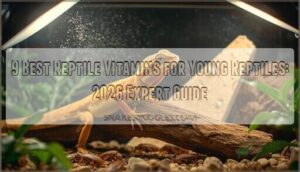This site is supported by our readers. We may earn a commission, at no cost to you, if you purchase through links.

It has an earthy, sharp smell—not exactly what you’d call "pleasant," but it’s historically prized for its unique properties.
Ancient cultures believed it had medicinal and even mystical powers, and modern perfumers are drawn to its bold, animalic undertones for creating daring fragrances.
The ethical catch is that harvesting snake musk can raise animal welfare concerns, so sustainable synthetic alternatives are gaining ground.
If you’re intrigued, you’re not alone—this enigmatic substance bridges ancient traditions and innovative science, leaving plenty of mystery (and a strong scent) to unpack.
Table Of Contents
Key Takeaways
- Snake musk is a pungent defensive secretion with a sharp, earthy smell, historically valued for its mystical and medicinal properties and now inspiring modern perfumery.
- Ancient beliefs tied snake musk to sensuality, fertility, and power, while ethical concerns today drive the use of sustainable synthetic alternatives.
- This secretion isn’t venomous but serves as a potent survival mechanism, deterring predators by overwhelming them with its stench.
- Humane collection techniques and cruelty-free synthetic options are reshaping how snake musk is used ethically in science and fragrance industries.
The Enigmatic Allure
When you hear “snake musk,” your first thought might be “ugh,” but there’s something strangely fascinating about it.
The musk attraction isn’t just about its intense scent—it taps into a unique blend of fear, mystery, and curiosity.
Historically, serpent musk was whispered about for its supposed powers of heightened intimacy, making it part of cultural lore about sensuality and animal magnetism.
People were drawn to its allure chemistry, seeing it as both a deterrent and a cure.
It’s a sensory experience that stirs curiosity even now—proof that reptile musk holds a strange yet undeniable snake charm through time.
The study of a snake that looks like mythical creatures can provide insight into the origins of such fascinations with snake musk.
Origins and History
You mightn’t think a snake’s stinky defense mechanism has much of a backstory, but snake musk’s origins stretch deep into nature’s evolutionary playbook.
From scaring off predators to intriguing ancient humans, it’s been around for centuries—smelly but surprisingly significant.
Cultural Significance
Snake musk carries deep symbolic meaning, entwined with folk beliefs and cultural taboos.
Ancient rituals revered its potent essence, while social norms often cast it as forbidden allure.
Modern perfumery often utilizes ethical musk alternatives like ambrette seed oil or synthetic musks.
Across traditions, this exotic musk symbolized power, fertility, or sin.
Stories of serpent musk’s seductive charm influenced art, poetry, and rituals, showcasing its timeless role as nature’s raw and mysterious wildlife perfume.
Traditional Uses
Across civilizations, exotic musk has been a star in ancient remedies and cultural rituals.
Snake musk has been cherished for:
- Musk Medicine: Folk practices credit it with aphrodisiac and healing properties.
- Herbalism Uses: Some cultures even infused it into regional culinary dishes.
- Religious Significance: The musk fragrance symbolized purity or power, used in spiritual rites.
Understanding the importance of venomous snake handling is essential for those who work with snakes that produce musk.
Mother Nature’s snake oil, reimagined!
Ethical Considerations
Regarding snake musk, it’s important to think about how it’s collected and the impact on the animals.
You wouldn’t want to support practices that stress or harm snakes just to get their scent, right?
Harvesting Methods
Traditional musk harvesting relied on tormenting and even killing snakes—a grim fate that we’ve thankfully moved past.
Modern extraction techniques focus on humane alternatives. Captive milking is a clever way to collect musk secretion ethically, though it yields less product.
Snake farming offers a balance, maintaining snakes in controlled environments for natural musk production. Synthetic musk, meanwhile, skips animals altogether, replicating the scent in labs.
With these methods, musk collection embraces a future of compassion without compromising the intrigue of this unique substance. The development of reptile embryos, particularly through reptile embryology studies, has also led to a greater understanding of snake biology and conservation.
Animal Welfare Concerns
You might think snake musk just smells bad, but the real stink lies in the unethical practices behind it.
Wildlife conservation is at risk when snakes are poached, stressed, and killed.
Here’s what harms animal welfare most:
- Cruel extractions causing distress.
- Cramped conditions damaging reptile welfare.
- Habitat destruction, risking snake conservation.
Fortunately, many consumers now opt for cruelty free fragrances as a humane alternative.
Protect pet safety and embrace humane alternatives!
The Scent Itself
When you first smell snake musk, you might think it’s a mix of burnt hair and rotten eggs—it’s that pungent.
This bizarre cocktail of sharp, earthy odors, particularly snake musk, plays a big role in survival and even attraction.
Olfactory Characteristics
There’s no denying the pungent, animalic scent of snake musk—it’s like nature’s emoji for "back off."
Its unique musk composition includes compounds like indole and fatty acids, creating a bold musk aroma that lingers, rippling through your smell perception.
This odorous cocktail speaks to your primal instincts, blending skunky sharpness with earthy tones.
Its fragrance chemistry balances allure and aversion perfectly.
The study of snake musk oil properties has led to a deeper understanding of its primal allure and the complex reactions it triggers in humans.
Aphrodisiac Properties
Some believe the musk aroma isn’t just foul—it’s nature’s love potion.
Snake pheromones in musk are linked to arousal, making it a long-standing pick in exotic traditions.
Here’s why it’s buzzing:
- Snake pheromones: Natural stimulants for sensual scents.
- Unique chemicals: Tied to heightened libido.
- Historic use: Hints at erotic aromas enchanting admirers.
Modern Applications
You’d be surprised to know snake musk has slithered its way into modern perfumery, where its earthy notes inspire unique fragrances.
Companies now explore synthetic alternatives to mimic its aroma without involving actual snakes, blending science and creativity for sustainable options.
Perfumery and Fragrance Industry
Crafting perfumes with snake musk merges ancient tradition and modern fragrance chemistry.
Its earthy allure once dominated scent design, but ethical concerns shifted focus to synthetic musk.
Today, musk perfume carries mystery and sophistication, blending aroma compounds and essential oils for innovative perfume trends.
Reptile perfume’s past captivates, while synthetic advancements shine as sustainable yet appealing alternatives in the evolving world of perfumery.
The use of synthetic musk perfume has become a vital aspect of modern perfumery, offering a viable alternative to natural musk extracts.
Sustainable Alternatives
Looking for Eco Friendly Options to replace snake musk? You’re in luck! Sustainable fragrance alternatives now include synthetic musk, plantbased musks, and clean Natural Substitutes that protect wildlife.
Stay guilt-free with these biodegradable solutions:
- Botanical musks: Ambrette seed and muskflower offer rich, organic solutions.
- Synthetic musk: Mimics snake musk without animal harm.
- Hyraceum: Ethical and cruelty-free.
When creating a habitat for a pet snake, considering affordable snake options is essential for providing a safe and comfortable environment.
Frequently Asked Questions (FAQs)
What is snake musk?
It’s like a snake’s version of a skunk spray—snake musk is a nasty-smelling liquid they release when scared.
Produced in their cloaca, it reeks of rotten eggs and keeps predators (and humans) far away.
Is snake musk venomous?
Snake musk isn’t venomous, so it won’t harm you chemically.
However, the stench might make you wish otherwise.
It’s just a defense mechanism, more about survival than causing actual physical danger.
How to get rid of snake musk?
Scrub the area with vinegar or Dawn dish soap to cut through the stink.
Hand sanitizer helps too.
For clothes, wash immediately.
Snake musk’s smell is stubborn, so patience and thorough cleaning are your best allies.
What is snake musk defense?
Imagine a stinky punch to the nose—snake musk defense is their way of yelling, "Back off!"
When threatened, they release a foul-smelling liquid from their cloaca, overwhelming predators and securing a quick getaway.
Why do snakes musk?
When snakes feel cornered or at risk, they release musk—a stinky, chemical-laden liquid—as a smelly defense move.
This can be thought of as their “get-away” skunk spray, overwhelming predators and helping them escape danger.
Do Snakes release musk?
When life corners a snake, it’s like that friend with a no-filter mouth—it lets out musk.
Yep, snakes release a nasty-smelling liquid from their cloaca to fend off threats and gross out predators.
Do snakes musk when scared?
When snakes feel scared or threatened, they’ll often release musk—a foul-smelling liquid meant to repel predators.
It’s their way of saying, “Back off!” Think of it as their natural version of pepper spray.
Do milk snakes musk a lot?
When milk snakes feel cornered, they can release musk like a skunk’s odorous prank.
While they’re not heavy muskers compared to others, stress or frequent handling might turn them into tiny stink-bombs.
How is snake musk obtained humanely?
You can humanely collect snake musk by gently handling the snake and stimulating its cloacal glands during routine care.
Always make certain the snake feels safe by minimizing stress, using soft movements, and proper restraint techniques.
Are there any synthetic alternatives available?
You won’t find synthetic alternatives for snake musk yet—nature’s still holding the patent.
Researchers might create substitutes someday, but for now, no lab has bottled that funky, reptilian essence in a test tube.
Conclusion
Like a secret whispered through time, snake musk connects the ancient and the modern in a truly unique way.
Its bold, earthy aroma continues to inspire, whether in perfumery or as a symbol of untamed nature’s power.
While its historic uses highlight its mystique, today’s focus on sustainable alternatives guarantees ethical progress without losing the allure.
If you’re captivated by its story, snake musk offers a rare mix of tradition and innovation—an aroma that’s as intriguing as its legacy.
- https://www.reddit.com/r/snakes/comments/hp5m3j/what_is_snake_musk_and_what_does_it_smell_like/
- https://www.lastwordonnothing.com/2020/10/16/snake-hands/
- https://bearworks.missouristate.edu/theses/1344/
- https://www.fieldherpforum.com/forum/viewtopic.php?t=12229
- https://link.springer.com/article/10.1007/BF00979486


